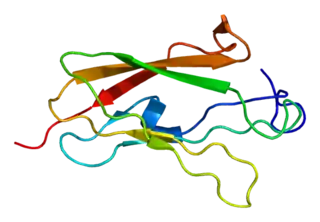FLNA
La filamina A (FLNA) es una proteína codificada en humanos por el gen FLNA.[1][2]
| Filamina A | ||||
|---|---|---|---|---|
 Estructura tridimensional de la proteína FLNA. | ||||
| Estructuras disponibles | ||||
| PDB |
Lista de códigos PDB 2aav
| |||
| Identificadores | ||||
| Símbolos | FLNA (HGNC: 3754) ABP-280; ABPX; DKFZp434P031; FLN; FLN1; FMD; MNS; NHBP; OPD; OPD1; OPD2; filamin A | |||
| Identificadores externos | ||||
| Locus | Cr. X q28 | |||
| Ortólogos | ||||
| Especies |
| |||
| Entrez |
| |||
| UniProt |
| |||
| RefSeq (ARNm) |
| |||
La filamina A, o proteína de unión a actina, es una proteína de 280 kDa que entrecruza los filamentos de actina en redes ortogonales en citoplasma cortical y participa en el anclaje de proteínas de membrana a través del citoesqueleto de actina. La remodelación del citoesqueleto es crucial para la modulación de la forma celular y la migración. La filamina A es una proteína ampliamente expresada que regula la organización del citoesqueleto de actina mediante interacción con integrinas, complejos de receptores transmembrana y segundos mensajeros.[3]
Interacciones
La filamina A ha demostrado ser capaz de interaccionar con:
Referencias
- Gorlin JB, Henske E, Warren ST, Kunst CB, D'Urso M, Palmieri G, Hartwig JH, Bruns G, Kwiatkowski DJ (Oct de 1993). «Actin-binding protein (ABP-280) filamin gene (FLN) maps telomeric to the color vision locus (R/GCP) and centromeric to G6PD in Xq28». Genomics 17 (2): 496-8. PMID 8406501. doi:10.1006/geno.1993.1354.
- Robertson SP, Twigg SR, Sutherland-Smith AJ, Biancalana V, Gorlin RJ, Horn D, Kenwrick SJ, Kim CA, Morava E, Newbury-Ecob R, Orstavik KH, Quarrell OW, Schwartz CE, Shears DJ, Suri M, Kendrick-Jones J, Wilkie AO (Mar de 2003). «Localized mutations in the gene encoding the cytoskeletal protein filamin A cause diverse malformations in humans». Nat Genet 33 (4): 487-91. PMID 12612583. doi:10.1038/ng1119.
- «Entrez Gene: FLNA filamin A, alpha (actin binding protein 280)».
- Nagano, Takashi; Yoneda Takunari, Hatanaka Yumiko, Kubota Chikara, Murakami Fujio, Sato Makoto (Jul. de 2002). «Filamin A-interacting protein (FILIP) regulates cortical cell migration out of the ventricular zone». Nat. Cell Biol. (England) 4 (7): 495-501. ISSN 1465-7392. PMID 12055638. doi:10.1038/ncb808.
- Ohta, Y; Suzuki N, Nakamura S, Hartwig J H, Stossel T P (Mar. de 1999). «The small GTPase RalA targets filamin to induce filopodia». Proc. Natl. Acad. Sci. U.S.A. (UNITED STATES) 96 (5): 2122-8. ISSN 0027-8424. PMID 10051605.
- Tu, Yizeng; Wu Shan, Shi Xiaohua, Chen Ka, Wu Chuanyue (Apr. de 2003). «Migfilin and Mig-2 link focal adhesions to filamin and the actin cytoskeleton and function in cell shape modulation». Cell (United States) 113 (1): 37-47. ISSN 0092-8674. PMID 12679033.
- Sheen, Volney L; Feng Yuanyi, Graham Donna, Takafuta Toshiro, Shapiro Sandor S, Walsh Christopher A (Nov. de 2002). «Filamin A and Filamin B are co-expressed within neurons during periods of neuronal migration and can physically interact». Hum. Mol. Genet. (England) 11 (23): 2845-54. ISSN 0964-6906. PMID 12393796.
- Hjälm, G; MacLeod R J, Kifor O, Chattopadhyay N, Brown E M (Sep. de 2001). «Filamin-A binds to the carboxyl-terminal tail of the calcium-sensing receptor, an interaction that participates in CaR-mediated activation of mitogen-activated protein kinase». J. Biol. Chem. (United States) 276 (37): 34880-7. ISSN 0021-9258. PMID 11390380. doi:10.1074/jbc.M100784200.
- Awata, H; Huang C, Handlogten M E, Miller R T (Sep. de 2001). «Interaction of the calcium-sensing receptor and filamin, a potential scaffolding protein». J. Biol. Chem. (United States) 276 (37): 34871-9. ISSN 0021-9258. PMID 11390379. doi:10.1074/jbc.M100775200.
- Bellanger, J M; Astier C, Sardet C, Ohta Y, Stossel T P, Debant A (Dec. de 2000). «The Rac1- and RhoG-specific GEF domain of Trio targets filamin to remodel cytoskeletal actin». Nat. Cell Biol. (ENGLAND) 2 (12): 888-92. ISSN 1465-7392. PMID 11146652. doi:10.1038/35046533.
- He, X; Li Y, Schembri-King J, Jakes S, Hayashi J (Aug. de 2000). «Identification of actin binding protein, ABP-280, as a binding partner of human Lnk adaptor protein». Mol. Immunol. (England) 37 (10): 603-12. ISSN 0161-5890. PMID 11163396.
- Donaldson, John C; Dise Rebecca S, Ritchie Marylyn D, Hanks Steven K (Aug. de 2002). «Nephrocystin-conserved domains involved in targeting to epithelial cell-cell junctions, interaction with filamins, and establishing cell polarity». J. Biol. Chem. (United States) 277 (32): 29028-35. ISSN 0021-9258. PMID 12006559. doi:10.1074/jbc.M111697200.
- Yuan, Y; Shen Z (Dec. de 2001). «Interaction with BRCA2 suggests a role for filamin-1 (hsFLNa) in DNA damage response». J. Biol. Chem. (United States) 276 (51): 48318-24. ISSN 0021-9258. PMID 11602572. doi:10.1074/jbc.M102557200.
- van der Flier, Arjan; Kuikman Ingrid, Kramer Duco, Geerts Dirk, Kreft Maaike, Takafuta Toshiro, Shapiro Sandor S, Sonnenberg Arnoud (Jan. de 2002). «Different splice variants of filamin-B affect myogenesis, subcellular distribution, and determine binding to integrin [beta] subunits». J. Cell Biol. (United States) 156 (2): 361-76. ISSN 0021-9525. PMID 11807098. doi:10.1083/jcb.200103037.
- Loo, D T; Kanner S B, Aruffo A (Sep. de 1998). «Filamin binds to the cytoplasmic domain of the beta1-integrin. Identification of amino acids responsible for this interaction». J. Biol. Chem. (UNITED STATES) 273 (36): 23304-12. ISSN 0021-9258. PMID 9722563.
- Tsuchiya, H; Iseda T; Hino O (Jul. de 1996). «Identification of a novel protein (VBP-1) binding to the von Hippel-Lindau (VHL) tumor suppressor gene product». Cancer Res. (UNITED STATES) 56 (13): 2881-5. ISSN 0008-5472. PMID 8674032.
- Zhou, Mina I; Wang Hongmei, Ross Jonathan J, Kuzmin Igor, Xu Chengen, Cohen Herbert T (Oct. de 2002). «The von Hippel-Lindau tumor suppressor stabilizes novel plant homeodomain protein Jade-1». J. Biol. Chem. (United States) 277 (42): 39887-98. ISSN 0021-9258. PMID 12169691. doi:10.1074/jbc.M205040200.
Enlaces externos
Este artículo ha sido escrito por Wikipedia. El texto está disponible bajo la licencia Creative Commons - Atribución - CompartirIgual. Pueden aplicarse cláusulas adicionales a los archivos multimedia.